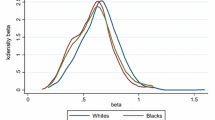Summary
This paper fits in with the literature on signaling, and it stresses the role of sequentially improved job-worker allocation. Allocation is initially done on the basis of signals but later, on the basis of true abilities, as revealed from productive performance. The model yields predictions in line with observations: upward sloping average age-earnings profiles, increasing wage dispersion within signal classes (such as schooling), increasing effect of ability on earnings, higher earnings growth for abler individuals. The model thus demonstrates that the gradual sorting-out of individuals into jobs may be very important, and it also indicates how information on individual abilities may gradually emerge.
Similar content being viewed by others
References
Freeman, S. (1977), “Wage Trends as Performance Displays Productive Potential a Model and Application to Academic Early Retirement,”Bell Journal of Economics, 8 (2), pp. 419–443.
Hartog, J. (1978),Personal Income Distribution: A Multicapability Theory, Ph.D. Dissertation Rotterdam, published by Martinus Nijhoff, Boston and Leiden; the theory is summarized in “On the Multicapability Theory of Income Distribution,”European Economic Review, 10 (2), pp. 151–171, the empirical part in “Earnings and Capability Requirements,”Review of Economics and Statistics, LXII (2), May 1980, pp. 230–240.
Hartog, J. (1979),Job Mobility, Job Characteristics and Earnings, Discussion Paper 7902/G, Institute for Economic Research, Erasmus University Rotterdam.
Hause, J.C. (1972), “Earnings Profile: Ability and Schooling,”Journal of Political Economy, 80 (311), pp. S108-S138.
Jovanovic, B. (1979), “Job Matching and the Theory of Turnover,”Journal of Political Economy, 87 (5, part 1), pp. 972–990.
Lydall, H. (1968),The Structure of Earnings, London.
MacDonald, G.M. (1980), “Person-Specific Information in the Labor Market,”Journal of Political Economy, 88 (3), pp. 578–597.
Mandelbrot, B. (1972), “Paretian Distributions and Income Maximization,”Quarterly Journal of Economics, LXXVI, pp. 57–85.
Mincer, J. (1970), “The Distribution of Labor Incomes,”Journal of Economic Literature, VIII (1), pp. 1–25.
Rosen, S. (1978), “Substitution and Division of Labor,”Economica, 45, pp. 235–250.
Ross, S., P.J. Taubman and M.L. Wachter (1978),Learning by Observing and the Distribution of Wages, Paper presented to the NBER Conference on Low Income Labor Markets.
Roy, A.D. (1951), “Some Thoughts on the Distribution of Earnings,”Oxford Economic Papers, 3, pp. 135–146.
Sattinger, M. (1975), “Comparative Advantage and the Distribution of Earnings and Abilities,”Econometrica, 43 (3), pp. 455–468.
Sattinger, M. (1978), “Comparative Advantage in Individuals,”Review of Economics and Statistics, LX (2), pp. 259–267.
Sattinger, M. (1980),Capital and the Distribution of Labor Earnings, Amsterdam.
Spence, A.M. (1974),Market Signaling, Cambridge.
Taubman, P.J. (1975),Sources of Inequality in Earnings, Amsterdam.
Thurow, L.C. (1975),Generating Inequality, New York.
Tinbergen, J. (1956), “On the Theory of Income Distribution,”Weltwirtschaftliches Archiv, LXXVII, pp. 156–175.
Tinbergen, J. (1975),Income Distribution, Analysis and Policies, Amsterdam.
Author information
Authors and Affiliations
Additional information
The basic ideas were outlined earlier in the second part of my Discussion Paper 508-78, Institute for Research on Poverty, Madison, Wisconsin. I greatly benefitted from seminars given at the Poverty Institute as well as Erasmus University and in particular acknowledge comments and suggestions by John Bishop, Glen Cain, Jo Ritzen, and Burt Weisbrod.
Rights and permissions
About this article
Cite this article
Hartog, J. Wages and allocation under imperfect information. De Economist 129, 311–323 (1981). https://doi.org/10.1007/BF01371745
Issue Date:
DOI: https://doi.org/10.1007/BF01371745




